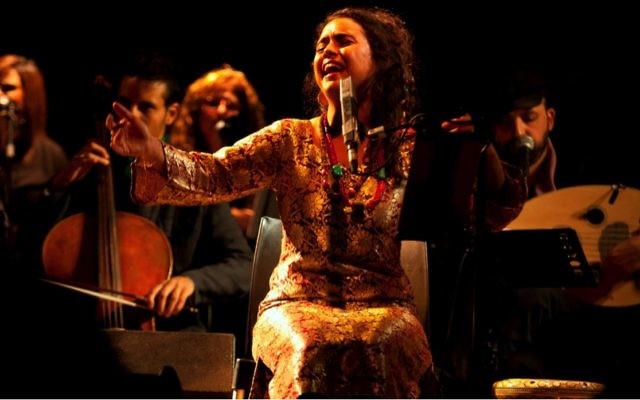Music Showcase Highlights Jewish Cultural Traditions
Middle Eastern and North African Jewish folk music help elevate Israel's music scene at the Zolelet Jazz and World Music Showcase.

I attended the Zolelet Jazz and World Music Showcase in Jerusalem and Tel Aviv in early November. Produced with the support of the Israeli Ministry of Foreign Affairs and Ministry of Culture and Sport, the event presented some of Israel’s finest musicians to a diverse international group of invitees.
Israelis have risen to elite levels of music genres all over the globe, especially in the world of jazz. While jazz music was certainly showcased, however, many of the performers presented traditional music from Jewish communities in the Middle East and North Africa.
In the 1950s and ’60s, around 1 million Jews from Muslim lands came to Israel, broadening its cultural landscape. Today, the Judeo-Arabic folk music that many of the featured artists’ parents and grandparents brought to Israel is being revived by a new generation of Israeli musicians.
One of the showcase’s headlining artists was Neta Elkayam, whose Moroccan Jewish-Arabic music was the centerpiece of the first day’s performances.
In a 2013 interview, Elkayam explained the roots of her musical background: “My grandmother … spoke Moroccan Arabic to me almost exclusively. … She came to Israel in 1956. … My parents spoke (Moroccan Arabic) so that we wouldn’t understand, though we understood perfectly, and the children in the neighborhood peppered their Hebrew with Moroccan Arabic — it was part of the slang. … I developed an irresistible thirst and excitement for North African music. … The Jewish-Moroccan songs are accompanied by the never-ending conversation over the historical connection to the Jews — whether Moroccan Jews living in Israel are still part of the Moroccan nation.”
Many artists in the showcase echoed Elkayam’s passion for reviving the music of her family’s past.
The band Gulaza is composed of “four artists who came together to continue the natural evolution of Yemenite women’s songs, instinctive and mystical texts that have passed for centuries from mother to daughter.”
Jazz trumpeter Itamar Borochov “connects Manhattan, North Africa, modern Israel and ancient Bukhara.”
Yinon Muallem “comes together with Turkish singer Gülseven Medar … to take listeners on a musical odyssey with medieval Jewish and Sufi poets,” while Mark Eliyahu’s “mastery of his kamancha (a traditional Iranian bowed string instrument), which was constructed 150 years ago, has become a thing of international reputation.”
Those were just some of the featured artists at this unique musical revival.
Rock, pop, hip-hop, electronic, classical and jazz are pervasive throughout Israel, and this will not change. These modern interpretations of Middle Eastern and North African Jewish folk music are taking Israel’s impressive, high-caliber music scene by storm. They are widely embraced in Israel and abroad.
The variety of Israel’s music provides the rest of the world with vivid tones about Judaism’s rich traditions, representing the cultural diversity that is Israel.



comments